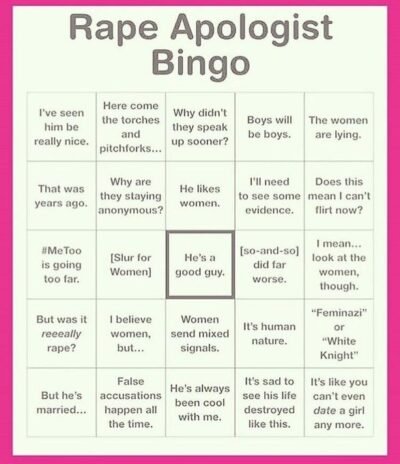A rape apologist is someone who defends, excuses, minimizes, or justifies acts of sexual violence—whether directly or indirectly. This can look like:
 A rape apologist is someone who defends, excuses, minimizes, or justifies acts of sexual violence—whether directly or indirectly.
A rape apologist is someone who defends, excuses, minimizes, or justifies acts of sexual violence—whether directly or indirectly.
This can look like:
Blaming the victim: “Well, what was she wearing?”
Dismissing the harm: “It wasn’t really that bad.”
Doubting without cause: “I just don’t believe someone like him would do that.”
Protecting the accused over the harmed: “He has a bright future. Why ruin his life over one mistake?”
Claiming neutrality that favors power: “We don’t know what really happened, so we should just stay out of it.”
It’s not always loud or obvious. Sometimes it hides in “politeness,” “objectivity,” or concern for “both sides.” But the harm it causes is real, long-lasting, and dangerous.
💔 How This Impacts Survivors
Rape apologism:
Silences victims before they even speak
Discourages reporting of sexual violence
Shames and isolates those who come forward
Re-traumatizes Survivors who hear their experiences minimized or mocked
It tells people—especially women and girls—that their pain is negotiable and that their safety is always up for debate.
🚨 How This Supports Predators
When rape apologism becomes common in a culture or community:
Predators feel empowered to keep harming others
Consequences become rare, especially for powerful or well-liked offenders
Warnings are ignored, even when multiple people come forward
People learn how to manipulate the narrative—and society lets them
This makes all of us less safe, especially children, women, LGBTQ+ people, and those with less institutional power.
👧🏾 How This Endangers Women and Girls
Girls and women are often told to:
Be careful what they wear
Don’t drink too much
Don’t walk alone
Don’t ruin a man’s reputation
But rarely are boys and men told:
Don’t coerce
Don’t cross boundaries
Don’t exploit power imbalances
Don’t harm
Rape apologism keeps the focus on what she did instead of what he chose.
This contributes to:
Victim blaming in schools, courts, and communities
Unaddressed harm in families, relationships, and institutions
A culture where safety is seen as optional for women
🛡️ Naming It Helps Us Stop It
Words like “rape apologist” aren’t meant to shut down conversation. They are meant to shine light on dangerous patterns—so we can name them, reject them, and create a culture that protects the harmed instead of the harmful.
Every time we challenge rape apologism, we:
Protect potential victims
Support healing for Survivors
Send a message to predators: You are not welcome here
